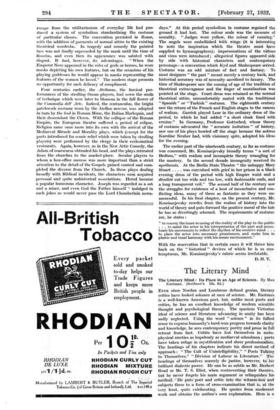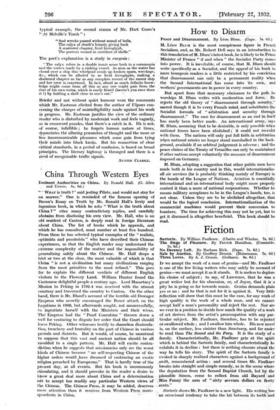The Literary Mind
The Literary Mind : Its Place in an Age of Science. By Max Evna since Nordau and Lombroso defined genius, literary critics have looked askance at men of science. Mr. Eastman is a well-known American poet, but, unlike most poets and critics, he has an excellent knowledge of modern scientific thought and psychological theory. The spaeious Victorian ideal of science and literature advancing in amity has been sadly neglected. Using the word " science " in its fullest sense to express humanity's hard-won progress towards clarity and knowledge, he sees contemporary poetry and prose in full retreat from fact Critics have lost themselves in meta- physical niceties as hopelessly as mediaeval schoolmen ; poets have taken refuge in mystification and sheer professionalism:. The headings of his chapters indicate his direct method: of approach " The Cult of Unintelligibility," " Poets Talking to Themcelves," " Division of Labour in Literature." The headings of themselves scarcely do justice, however; to his brilliant dialectic power. He can 'be as-subtle as Mr. Herbert Read or Mr. T. S. Eliot, when controverting their theories, but he -never forgets- his main argument or relinquishes his 3:FIO PUtS'poet And Critic -ivitile4s-boi and Subjects them to -a form of cross-examination that is, at the very least, quite exhilarating. He quotes from modernist work and obtains the author's own explanation. Here is a
typical example, the second stanza of Mr. Hart Crane's "At Melville's Tomb " : "And wrecks passed without sound of bells, The calyx of death's bounty giving back A scattered chapter, livid hieroglyph,
The portent wound in corridors of shells."
The poet's explanation is a study in exegesis.:
• " The calyx refers in a double ironic sense both to a cornucopia and the vortex made by a sinking vessel. As soon as the water has closed over a ship this whirlpool sends up• broken spars, wreckage, &e., which can ship alluded to as livid hieroglyphs, making a shattered Chapter so far as any complete record of the secant ship and her crew is, concerned: In fact, about as mush definite know.' li?dge might come from all this as any one might gain from the rear of his own veins,, which is. easily heard (haven't you suer done
it ?) by holding a shell close to one's ear." •
- Briefer and not without quiet humour were the comments which Mr. Eastman elicited from the author of Ulysses con- cerning the charges of unintelligibility made against' his work in progress. Mr. Eastman justifies the view of the ordinary reader who is disturbed by modernist work and feels vaguely, as in crossword puzzles, that there's a catch in it. He is not, 4' course, • infallible ; he forgets human nature at times, depreciates the alluridg penumbra of thought and the more or less incommunicable pleasures which some gain from tying their minds into black knots. But his reassertion of clear critical standards, in a period of confusion, is based on broad Principles. The literary highway is thronged and there is a steed of recognizable traffic signals.
Ausnrir CLARICE.



































 Previous page
Previous page